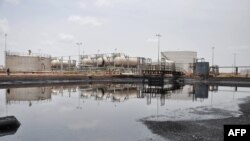JUBA —
South Sudan has restarted oil production after agreeing with Sudan to resume cross-border oil flows last month, an executive at the state oil company said on Saturday. After months of negotiations both African countries agreed earlier this month to resume cross-border oil flows after tensions between them eased.
Landlocked South Sudan, which shut down its entire output of 350,000 barrels a day in a row with Khartoum over oil fees last year, needs to export its oil through Sudanese pipelines and the port of Port Sudan.
"Yes it has started," Paul Adong Bith Deng, managing director of state oil firm Nile Petroleum (Nilepet), told Reuters by phone from the Thar Jath oilfield in Unity state, South Sudan, when asked whether oil production had been resumed.
Sudan and South Sudan agreed for the South to resume oil production with an initial output of between 150,000 bpd and 200,000 barrels bpd, Sudan's state news agency SUNA said late on Friday, quoting officials from both countries.
The first cargo would reach Port Sudan at the end of May, SUNA said, two weeks later than initially expected.
There was no immediate comment from South Sudan's Oil Ministry.
South Sudan's oil minister said on March 14 that oil companies in the South had been ordered to restart production, which he said would take two to three weeks.
Both countries depend heavily on crude exports for state revenues and use the foreign currency to import food and fuel.
South Sudan seceded from Sudan in 2011 under a 2005 peace deal which ended one of Africa's longest civil wars but both countries remain at loggerheads over ownership of disputed territories and other issues.
South Sudan is one of the world's least-developed nations and grows very little of its own produce. Its decision to turn off its oil wells triggered a deep recession.
Landlocked South Sudan, which shut down its entire output of 350,000 barrels a day in a row with Khartoum over oil fees last year, needs to export its oil through Sudanese pipelines and the port of Port Sudan.
"Yes it has started," Paul Adong Bith Deng, managing director of state oil firm Nile Petroleum (Nilepet), told Reuters by phone from the Thar Jath oilfield in Unity state, South Sudan, when asked whether oil production had been resumed.
Sudan and South Sudan agreed for the South to resume oil production with an initial output of between 150,000 bpd and 200,000 barrels bpd, Sudan's state news agency SUNA said late on Friday, quoting officials from both countries.
The first cargo would reach Port Sudan at the end of May, SUNA said, two weeks later than initially expected.
There was no immediate comment from South Sudan's Oil Ministry.
South Sudan's oil minister said on March 14 that oil companies in the South had been ordered to restart production, which he said would take two to three weeks.
Both countries depend heavily on crude exports for state revenues and use the foreign currency to import food and fuel.
South Sudan seceded from Sudan in 2011 under a 2005 peace deal which ended one of Africa's longest civil wars but both countries remain at loggerheads over ownership of disputed territories and other issues.
South Sudan is one of the world's least-developed nations and grows very little of its own produce. Its decision to turn off its oil wells triggered a deep recession.





